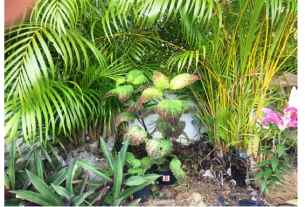By Tommy Clarkson from the July 2010 Edition
As many who read my column “Planting Roots in Mexico” know, nearly every day I can be found – along with my faithful friend and plant pal, Paco – working in our tropical gardens. But at some time this morning, mid-frond trim, the semantic question hit me. Prior to tending to these magnificent creations of nature, what had I been doing – pretending?
While I struggled with this new found language vagary, I became more and more wrought up culminating with abject disconcertment and in a somewhat tense state which in turn, begged the question as to whether all of my earlier calm and comfort was not in fact merely pretense!
What, I ask myself, is the nature and meaningful mission of this prefix – “pre?” In fact, the word itself is confusing for would it not logically follow that, by its very necessity, something would have to be broken before it was repaired – hence, in a state of “prefix?”
Before we amble off on a trek of evaluation and discovery we surely must commence with a preamble; and, prior to beginning to pare off superfluous, word extraneousness I suspect we must properly prepare. This may be a somewhat precarious path we tread. (By the way, “carious” means “having caries or decayed” but, interestingly, my dictionary makes no mention of rotten condition as regards the definition of “precarious!” Long aware of the twisted way of our speech, perhaps such is patently dictable . . . and if not that, at least, most assuredly predictable!
Now, I pose a bit of a philosophical question. If we accept the definition of “precept” as meaning “A rule or principle imposing a certain standard”, might not the lack thereof -regarding the use of “pre” – mean that we are in a state of pre-precept? Hey, don’t curse the observer! I’m only trying to clear things up here.
Let us give pause and curb an enthusiastic desire to be precipitant in jumping to conclusions – we’ve hardly had time to get comfortable with our condition of being cipitant . . . whatever that is, was or isn’t. (And with that having been said, I don’t think I’ll even begin to get into the similar semantics conundrum of precipitation/cipitation!)
My head hurts. Let’s strive to presently be precise and we can flounder with cise soon enough. Let’s preclude consideration of confusing words cluding only those we know. Focus, we must, on predictable – rather than those (I suppose) – durned dictable words. If not already cariously close, we are precariously so to the perilous precipice – if not cipice itself – of outright confusion.
At this juncture, I sense we are substantially past predicament and well wallowing in an outright, full scale, dicament. I wish I would have predetermined not to be so blasted determined to address this in the first place. I guess the results were dictable if not predictable.
So, spurning preamble, please allow me to merely amble off, back to my plants. My dependable – much easier to understand than our words – plants!
Download the full edition or view it online
—
Tommy Clarkson is a bit of a renaissance man. He’s lived and worked in locales as disparate as the 1.2 square mile island of Kwajalein to war-torn Iraq, from aboard he and Patty’s boat berthed out of Sea Bright, NJ to Thailand, Germany, Hawaii and Viet Nam; He’s taught classes and courses on creative writing and mass communications from the elementary grades to graduate level; He’s spoken to a wide array of meetings, conferences and assemblages on topics as varied as Buddhism, strategic marketing and tropical plants; In the latter category he and Patty’s recently book, “The Civilized Jungle” – written for the lay gardener – has been heralded as “the best tropical plant book in the last ten years”; And, according to Trip Advisor, their spectacular tropical creation – Ola Brisa Gardens – is the “Number One Tour destination in Manzanillo”.




